Unit 2
unit 2 单词(完整)
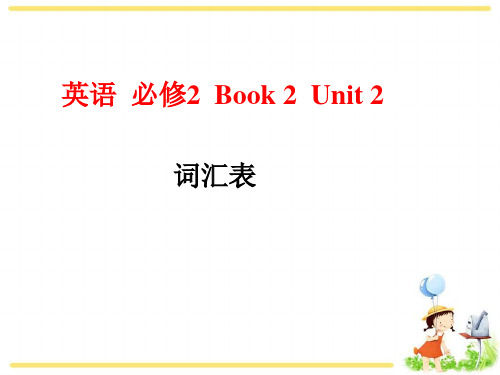
1.容许,准许……进(加)入 a.Only one hundred boys are admitted to/into
the school every year.
每年学校准许100名男生入校。
b.He is admitted as a member of the basketball team.
他被接受成为篮球队的一名队员。
4. take part in 参加;参与
They often _____ take _____ part ____ in outdoor
activities.
他们经常参加室外活动。
take part in join in join
参加活动,并在其中起 积极作用 参加小规模的活动如 “球赛、游戏”等 加入某人或某个组织成 为其中一员 参加会议、婚礼、典礼; 听报告、讲座
英语 必修2 Book 2 Unit 2
词汇表
1. ancient ['eɪnʃ(ə)nt] adj. 古代的.古老的 2. compete [kəm'piːt]vi. 比赛;竞争
petitor [kəm'petɪtə]n. 竞争者
The cycle of learning vi. 比赛;竞赛 compete [kəmˈpi:t] competitive [kəmˈpetətɪv] adj.竞争的 n. 比赛,竞赛 competition [ˌkɒmpəˈtɪʃn]
stand by sb.
反对
支持某人
辞职
stand out stand against
stand down
袖手旁观,支持
显眼,突出
7. △ mascot ['mæ skɒt] n 吉祥物
Unit 2 课文翻译
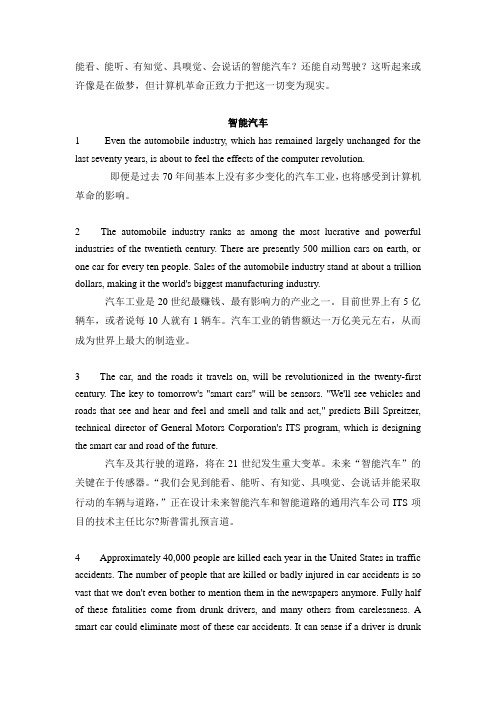
能看、能听、有知觉、具嗅觉、会说话的智能汽车?还能自动驾驶?这听起来或许像是在做梦,但计算机革命正致力于把这一切变为现实。
智能汽车1 Even the automobile industry, which has remained largely unchanged for the last seventy years, is about to feel the effects of the computer revolution.即便是过去70年间基本上没有多少变化的汽车工业,也将感受到计算机革命的影响。
2 The automobile industry ranks as among the most lucrative and powerful industries of the twentieth century. There are presently 500 million cars on earth, or one car for every ten people. Sales of the automobile industry stand at about a trillion dollars, making it the world's biggest manufacturing industry.汽车工业是20世纪最赚钱、最有影响力的产业之一。
目前世界上有5亿辆车,或者说每10人就有1辆车。
汽车工业的销售额达一万亿美元左右,从而成为世界上最大的制造业。
3 The car, and the roads it travels on, will be revolutionized in the twenty-first century. The key to tomorrow's "smart cars" will be sensors. "We'll see vehicles and roads that see and hear and feel and smell and talk and act," predicts Bill Spreitzer, technical director of General Motors Corporation's ITS program, which is designing the smart car and road of the future.汽车及其行驶的道路,将在21世纪发生重大变革。
unit 2(新探索研究生英语)

unit 2(新探索研究生英语)
《新探索研究生英语》是为非英语专业研究生开设的英语课程,旨在提高学生的英语应用能力和跨文化交际能力,培养具有国际视野和跨文化交际能力的高层次人才。
该课程包括听、说、读、写、译等方面的教学内容,注重培养学生的实际语言运用能力和跨文化交际能力。
通过课堂教学、研讨、实践活动等多种形式,鼓励学生积极参与、主动思考,提高其英语表达和交流能力。
此外,《新探索研究生英语》还注重培养学生的批判性思维和创新能力,鼓励学生独立思考、勇于探索,培养其创新意识和跨学科视野。
同时,该课程还注重培养学生的跨文化意识和跨文化交际能力,通过引入不同文化背景的素材和案例,帮助学生了解不同文化之间的差异和共性,提高其跨文化交际能力。
总之,《新探索研究生英语》是一门综合性、实用性和人文性相结合的英语课程,注重培养学生的英语应用能力和跨文化交际能力,有助于提高学生的综合素质和未来的职业发展。
(Unit 2)词汇巧记
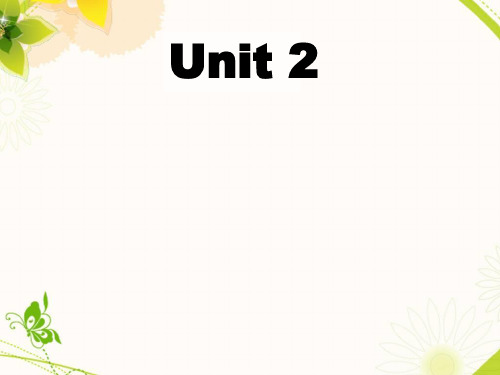
4. gas n. 汽油;气体;煤气;毒气 谐音:该死
记忆法:该死,煤气中毒了。
5. official adj.官方的;正式的;公务的 offic(英文office)办公室; i(英文)我; al(英文all)全部 记忆法:办公室已正式的规定,我是全部员工 的领导。
20. frequent adj.频繁的;常见的 fr(拼音)夫人;e(拼音)鹅;qu (拼音)去; e(拼音)鹅;nt(拼音)难题 记忆法:夫人虽然喜欢吃鹅,但频繁的去买鹅, 也是个难题。
21. usage n. 使用;用法;词语惯用法 us(英文)我们; age (英文)年龄 记忆法:我们对上了年龄的人使用敬语。
27. African adj. 非洲的;非洲人的 africa (英文)非洲;n(拼音)拿 记忆法:在非洲拿非洲人的东西是不好的。
(Unit 2)词汇巧记
28. eastern adj. 东方的;东部的 eas(英文easy)容易;te (拼音)特;rn(拼音)乳牛 记忆法:容易买到东方的特别乳牛。
记忆法:弟弟一乐就用传统方言说话。
25. expression n. 词语;表示;表达 ex(拼音)儿媳;press (英文)逼迫;i(英文)我; on(英文)在……上面 记忆法:儿媳逼迫我在上面做词语练习。 26. midwestern adj.中西部的;有中西部特性的 合成词: mid(英文)中间的; western (英文)西部的 记忆法:中间的加西部的,就是中西部的。
Unit 2
1. subway n. 地下人行道;<美>地铁 su (拼音)苏;b(拼音)伯;way(英文)路 记忆法:苏伯伯过马路走地下人行道。
unit 2知识点
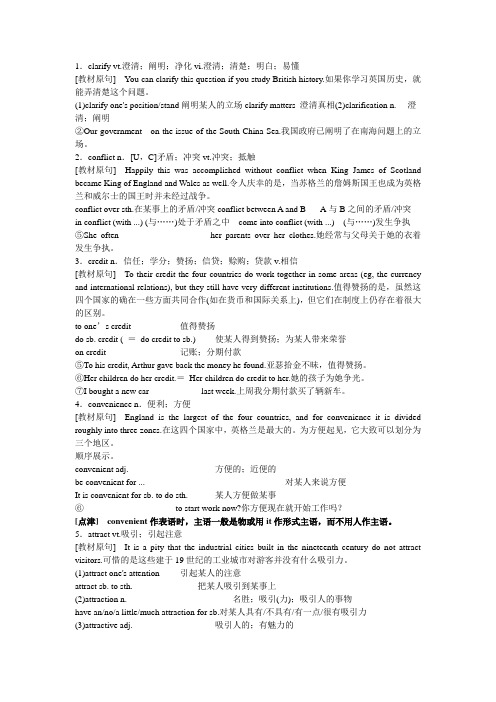
1.clarify vt.澄清;阐明;净化vi.澄清;清楚;明白;易懂[教材原句]You can clarify this question if you study British history.如果你学习英国历史,就能弄清楚这个问题。
(1)clarify one's position/stand阐明某人的立场clarify matters 澄清真相(2)clarification n. 澄清;阐明②Our government on the issue of the South China Sea.我国政府已阐明了在南海问题上的立场。
2.conflict n.[U,C]矛盾;冲突vt.冲突;抵触[教材原句]Happily this was accomplished without conflict when King James of Scotland became King of England and Wales as well.令人庆幸的是,当苏格兰的詹姆斯国王也成为英格兰和威尔士的国王时并未经过战争。
conflict over sth.在某事上的矛盾/冲突conflict between A and B A与B之间的矛盾/冲突in conflict (with ...) (与……)处于矛盾之中come into conflict (with ...) (与……)发生争执⑤She often her parents over her clothes.她经常与父母关于她的衣着发生争执。
3.credit n.信任;学分;赞扬;信贷;赊购;贷款v.相信[教材原句]To their credit the four countries do work together in some areas (eg, the currency and international relations), but they still have very different institutions.值得赞扬的是,虽然这四个国家的确在一些方面共同合作(如在货币和国际关系上),但它们在制度上仍存在着很大的区别。
大学英语教材unit2
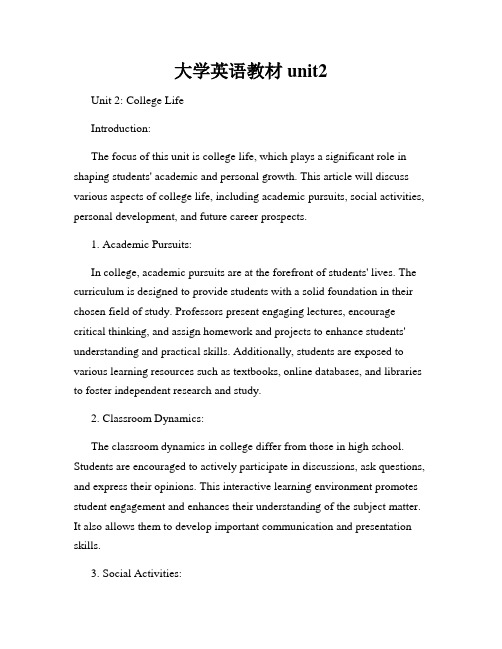
大学英语教材unit2Unit 2: College LifeIntroduction:The focus of this unit is college life, which plays a significant role in shaping students' academic and personal growth. This article will discuss various aspects of college life, including academic pursuits, social activities, personal development, and future career prospects.1. Academic Pursuits:In college, academic pursuits are at the forefront of students' lives. The curriculum is designed to provide students with a solid foundation in their chosen field of study. Professors present engaging lectures, encourage critical thinking, and assign homework and projects to enhance students' understanding and practical skills. Additionally, students are exposed to various learning resources such as textbooks, online databases, and libraries to foster independent research and study.2. Classroom Dynamics:The classroom dynamics in college differ from those in high school. Students are encouraged to actively participate in discussions, ask questions, and express their opinions. This interactive learning environment promotes student engagement and enhances their understanding of the subject matter. It also allows them to develop important communication and presentation skills.3. Social Activities:Apart from their academic commitments, college students engage in various social activities. These activities create opportunities for students to form friendships, develop social networks, and experience personal growth. Student clubs, cultural events, sports teams, and volunteer activities are popular choices for students to actively participate in their college community.4. Personal Development:College life offers a platform for personal growth and self-discovery. Students gain valuable life skills such as time management, organization, and responsibility as they juggle academics, extracurricular activities, and personal commitments. Living away from home and being independent also fosters self-reliance and decision-making abilities.5. Future Career Prospects:One of the primary goals of college education is to prepare students for their future careers. In addition to academic knowledge, college life offers various opportunities for students to develop professional skills. Internships, career fairs, and networking events provide avenues for students to gain practical experience and establish professional connections. Colleges also offer career counseling and guidance to help students explore different career paths and make informed decisions.Conclusion:College life is a transformative period that shapes students academically, socially, and personally. Through academic pursuits, engagement in social activities, personal growth, and future career prospects, students acquire thenecessary skills and experiences to succeed in their chosen fields. The holistic development offered by college life not only prepares students for their professional lives but also helps them become well-rounded individuals.。
必修二unit2单词表
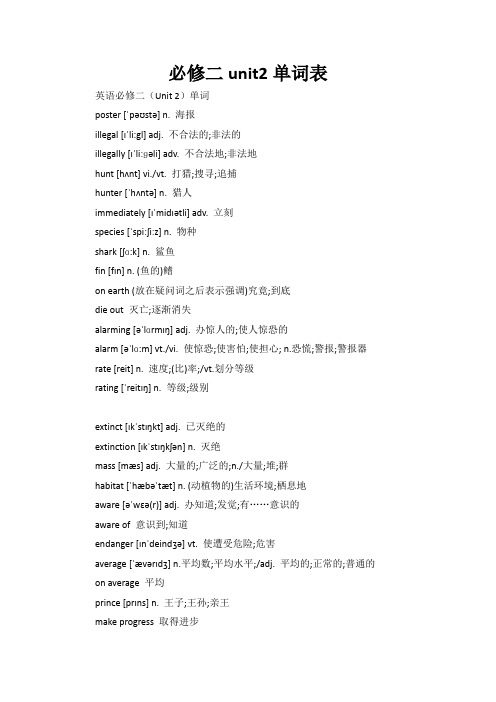
必修二unit2单词表英语必修二(Unit 2)单词poster [ˈpəʊstə] n. 海报illegal [ɪˈli:gl] adj. 不合法的;非法的illegally [ɪˈliːɡəli] adv. 不合法地;非法地hunt [hʌnt] vi./vt. 打猎;捜寻;追捕hunter [ˈhʌntə] n. 猎人immediately [ɪˈmidɪətli] adv. 立刻species [ˈspiːʃiːz] n. 物种shark [ʃɑ:k] n. 鲨鱼fin [fɪn] n. (鱼的)鳍on earth (放在疑问词之后表示强调)究竟;到底die out 灭亡;逐渐消失alarming [əˈlɑrmɪŋ] adj. 办惊人的;使人惊恐的alarm [əˈlɑ:m] vt./vi. 使惊恐;使害怕;使担心; n.恐慌;警报;警报器rate [reit] n. 速度;(比)率;/vt.划分等级rating [ˈreitɪŋ] n. 等级;级别extinct [ɪkˈstɪŋkt] adj. 已灭绝的extinction [ɪkˈstɪŋkʃən] n. 灭绝mass [mæs] adj. 大量的;广泛的;n./大量;堆;群habitat [ˈhæbəˈtæt] n. (动植物的)生活环境;栖息地aware [əˈwɛə(r)] adj. 办知道;发觉;有……意识的aware of 意识到;知道endanger [ɪnˈdeindʒə] vt. 使遭受危险;危害average [ˈævərɪdʒ] n.平均数;平均水平;/adj. 平均的;正常的;普通的on average 平均prince [prɪns] n. 王子;王孙;亲王make progress 取得进步concern [kənˈsɜːn] vt. 涉及;让……担忧concerned [kənˈsɜːnd] adj. 担心的;关切的concerned about 对……关切的;为……担忧的living [ˈlɪvɪŋ] adj. 居住的;活的;在用的;n./生活;生计adapt [əˈdæpt] vi.适应;/vt. 使适应;使适合adapt to 适应measure [ˈmɛʒə] n.措施;方法;/vt. 测量;度量;估量authority [ɔːˈθɒrəti] n. 官方;权威;当权pressure [ˈprɛʃə] n. 压力;要求under pressure 在承受压力whale [wel] n. 鲸antelope [ˈæntɪləʊp] n. 羚;羚类动物Tibetan antelope 藏羚羊reserve [rɪˈzɜːv] n.保护区;储藏(量);/vt. 预订;预留;保留plain [plein] n.平原; /adj. 简单明了的;直率的;平凡的make out 看清;听清;分清herd n.牧群;兽群observe [əbˈzɜːv] n. 观察(到);注视;遵守beauty [ˈbju:ti] n. 美;美人;美好的东西remind [rɪˈmaɪnd] vt. 提醒;使想起remind sb of sb/sth 使某人想起(类似的人或物)fur [fɜː] n. 毛(皮); 毛皮衣服herb [hɜːb] n. 兽群sacred [ˈsekrɪd] adj. s神圣的;受尊敬的shoot [ʃut] vt./vi. (shot,shot) 杀;射伤;发射profit [ˈprɑfɪt] n. 利润;利益watch ove 保护;照管;监督day and night 日日夜夜;夜以继日attack [əˈtæk] n./vi./vt. 攻击;抨击effective [ɪˈfɛktɪv] adj. 有效的;生效的recover [rɪˈkʌvə] vt. 恢复;康复;找回;寻回remove [rɪˈmuv] vt. 去除;移开;脱去intend [ɪnˈtɛnd] vi./vt. 打算;计划;想要threat [θrɛt] n. 威胁threaten [ˈθrɛtn] vt. 威胁;危及exist [ɪɡˈzɪst] vi. 存在;生存harmony [ˈhɑrməni] n.和谐;融洽goods [ɡʊdz] n. 商品;货物creature [ˈkritʃə] n. 生物;动物deer [dɪr] n. 鹿kangaroo [ˌkæŋɡəˈru:] n. 袋鼠reduce [rɪˈdjʊs] vt. 减少due [dju] adj. 由于;因为due to 由于;因为insect [ˈɪnsɛkt] n.昆虫net [nɛt] n.网(=Internet);/adj. 净得的;纯的neighbourhood [ˈneɪbərhʊd] n. 临近的地方;街区binoculars [bɪˈnɑkjəlɚz] n.b双筒望远镜bird field guide 鸟类图鉴search for 捜索;查找dolphin [ˈdɒlfɪn] n. 海豚Yangtze River dolphin 白鳍豚koala [kəʊˈɑ:lə] n. 树袋熊;考拉stir [stɜː] vt. 激发;搅动stir up 激起emotion [ɪˈməʊʃən] n. 感情;情感;情绪skin [skɪn] n. 皮;皮肤unusual [ʌnˈjʊʒʊəl] adj. 特别的;不寻常的Tibetan /tɪ’betn/ adj 西藏的; 藏语的; 藏族(人)的n.西藏人; 藏族人; 藏语Tibet /tɪ’bet/ n.西藏。
大学英语,unit2 单词
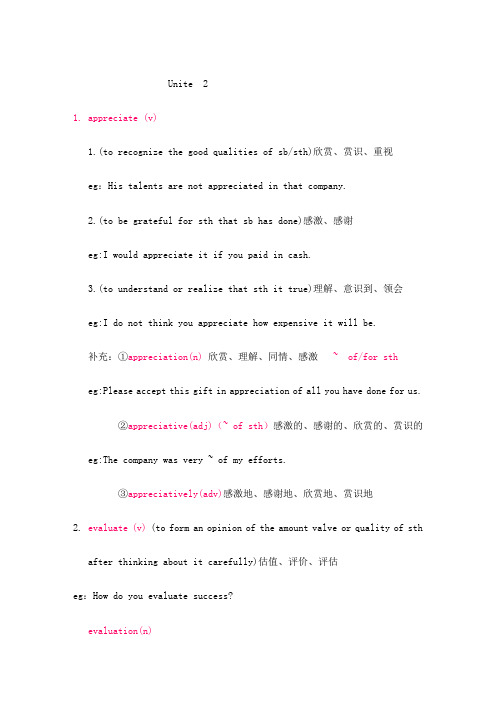
Unite 21.appreciate (v)1.(to recognize the good qualities of sb/sth)欣赏、赏识、重视eg:His talents are not appreciated in that company.2.(to be grateful for sth that sb has done)感激、感谢eg:I would appreciate it if you paid in cash.3.(to understand or realize that sth it true)理解、意识到、领会eg:I do not think you appreciate how expensive it will be.补充:①appreciation(n)欣赏、理解、同情、感激 ~ of/for stheg:Please accept this gift in appreciation of all you have done for us.②appreciative(adj)(~ of sth)感激的、感谢的、欣赏的、赏识的eg:The company was very ~ of my efforts.③appreciatively(adv)感激地、感谢地、欣赏地、赏识地2.evaluate (v) (to form an opinion of the amount valve or quality of sthafter thinking about it carefully)估值、评价、评估eg:How do you evaluate success?evaluation(n)evaluative(adj) 可估价的 ~ abstract 评论性文摘3.persist(v)1.~ in (doing) sth| ~ with sth 坚持、执着eg: She persisted in her search for the truth.2.维持、保持、持续存在eg: The belief that the earth was flat persisted for many centuries.persistence(n)①坚持、执着、执意eg:His ~ was finally rewarded.②持续存在、维持persistent(adj)执着的、坚持不懈的eg:How do you deal with ~ salesmen.连绵的、持续的、反复出现的eg:~ rain/painpersistently(adv)persist persistenceinsist insistenceresist resistance4.recommendation(n)cn. ①. ~ (to sb) (for/on/about sth)正式建议、提议 eg:I had the operation on the recommendation of my doctor.②.推荐信、求职介绍信eg:The company gave her a ~.un. 推荐、介绍eg: We chose the hotel on their ~.recommend(v)①~ sb/sth(to sb)(for/as sth)推荐、举荐、介绍eg: I ~ the book to all my students.③劝告、建议eg: We`d ~ you to book your flight early.5.respectn. ①~(for sb/sth)敬意、尊重eg:I have the greatest ~ for your brother.②(事物的)方面、细节eg:In this ~ we are very fortunatein ~ of sth.关于、就…而言、作为…的报酬eg:He received much money in ~ of overtime work.v. ①~ sb/sth (for sth)尊重、尊敬、仰慕eg:I ~ his opinion on most subjects.②遵守、不损害、不违背eg:The new leader has promist to ~ the constitution(宪法). respectful(adj) 表示敬意的、尊敬的eg:The onlookers stood at a ~ distance.respectfully(adv) 表示敬意地、尊敬地eg:He listened ~ .6.respective(adj)分别的、各自的eg:They are each recognized specialists in their ~ fields. respectively(adv)分别、各自、顺序为、依次为eg:Julie and Mark,aged 17 and 19 ~.7.convince (v)①~ sb/youself(of sth ) 使确信,使相信,使信服eg:I had convinced myself that I was right.②说服,劝说eg:I have been trying to convince him to see a doctor. convinced(adj)① ~ (of sth / that …)坚信,深信,确信eg:I am convinced of her innocence.②坚定不移的,有坚定信仰的convincing (adj)令人信服的,有说服力的a ~ argument/case8.curiosity (n)①un.~ (about sth)/ ~ (to do sth)好奇心、求知欲eg: Children show ~ about everything.②cn.奇物、珍品eg: The museum is full of historical curiosities.curious(adj)①~ (about sth)/ ~ (to do sth)求知欲强的、好奇的eg:They were very ~ about the people who lived upstairs.②稀奇古怪的、奇特、不寻常eg:It was ~ that she did not tell anyone.curiously(adv)9.insightun.洞察力、领悟eg: With a flash of ~ I realized what the dream meant.cn.~ (into sth)洞悉、了解eg:The book gives us insights into life in Mexico.insightful(adj)有深刻了解的、富有洞察力的an ~ historian(史学家)10.invisible(adj)①~ (to sb/sth)看不见的、隐形的eg:Stars are ~ to the naked eye.②无形的 ~ exportsinvisibility(n) visible(adj)①看得见的、可见的eg: The house is clearly ~ from the beach.②明显的、能注意到的eg:She made a ~ effort to control her anger.visionun.视力、视野,眼力,远见卓识eg:Cats have good night ~ .cn.想象、幻想eg:He had a ~ of a world in which there would be no wars. veiw①~ (about/on sth )看法、意见、见解、态度eg: In my view it was a waste of time.②~ (of sth)方法、方式eg: He has an optimistic view of life.③un.观看、视野、视线eg: The lake soon come into view .④景色、风景eg: The view from the top of the tower was beautiful.短语:have sth in view心中有…目的(打算)in view of sth介于考虑到由于eg:In view of the weather,the event will not be held outdoors.vb①~ sb/sth as/with sth把…视为/以…方式看待eg:How do you view your position within the company.②看、观看eg:People came from all over the world to view her work.10..stirn. 搅拌;轰动vt. 搅拌;激起;惹起to stir one's coffee with a spoon用勺搅动咖啡vi. 搅动;传播;走动He didn't stir while sitting there.他坐在那里一动不动。
Unit 2 单词表
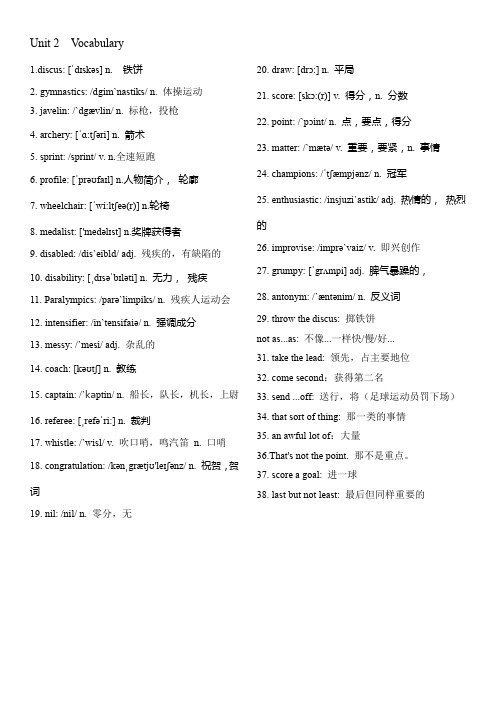
Unit 2 V ocabulary1.discus: [ˈdɪskəs] n. 铁饼2. gymnastics: /dgim`nastiks/ n. 体操运动3. javelin: /`dgævlin/ n. 标枪,投枪4. archery: [ˈɑ:tʃəri] n. 箭术5. sprint: /sprint/ v. n.全速短跑6. profile: [ˈprəʊfaɪl] n.人物简介,轮廓7. wheelchair: [ˈwi:ltʃeə(r)] n.轮椅8. medalist: ['medəlɪst] n.奖牌获得者9. disabled: /dis`eibld/ adj. 残疾的,有缺陷的10. disability: [ˌdɪsəˈbɪləti] n. 无力,残疾11. Paralympics: /parə`limpiks/ n. 残疾人运动会12. intensifier: /in`tensifaiə/ n. 强调成分13. messy: /`mesi/ adj. 杂乱的14. coach: [kəʊtʃ] n. 教练15. captain: /`ka ptin/ n. 船长,队长,机长,上尉16. referee: [ˌrefəˈri:] n. 裁判17. whistle: /`wisl/ v. 吹口哨,鸣汽笛n. 口哨18. congratulation: /kənˌgrætjʊ'leɪʃənz/ n. 祝贺,贺词19. nil: /nil/ n. 零分,无20. draw: [drɔ:] n. 平局21. score: [skɔ:(r)] v. 得分,n. 分数22. point: /`pɔint/ n. 点,要点,得分23. matter: /`mætə/ v. 重要,要紧,n. 事情24. champions: /ˈtʃæmpjənz/ n. 冠军25. enthusiastic: /insjuzi`astik/ adj. 热情的,热烈的26. improvise: /imprə`vaiz/ v. 即兴创作27. grumpy: [ˈgrʌmpi] adj. 脾气暴躁的,28. antonym: /`æntənim/ n. 反义词29. throw the discus: 掷铁饼not as...as: 不像...一样快/慢/好...31. take the lead: 领先,占主要地位32. come second:获得第二名33. send ...off: 送行,将(足球运动员罚下场)34. that sort of thing: 那一类的事情35. an awful lot of:大量36.That's not the point. 那不是重点。
Unit 2 知识梳理(课件)高二英语(译林版2020选择性必修第二册)

大致相近的估计 不公正的,伤人的 认输,承认失败
Look and learn
词组积累
be identical to complain about have faith in
与……一致 抱怨…… 对……有信心
Look and learn
词组积累
walk on air
die out make decisions
e elect vt. 挑选、选举 → election n. 选举,推选,当选
Look and learn
词汇积累
f fate n. 命运→faith n.信心;宗教信仰 follow v. 跟随 fellow adj.同伴的,同情况的,同类的
n.同辈,同类;男人,家伙 fist n.拳,拳头
g gradual adj. 逐渐的 → gradually adv.逐渐地,逐步地 great adj. 伟大的 n. 大人物 →grace n. 高雅,文稚;优美;风度,体面
词汇积累
Lc ook and learn
ceed 词根 行走、前进 → proceed vi.接着做,继而做
came来
→ flame n.激情 热情; 火焰,火舌
chair+man
→ chairman n. (委员会的)委员长
constitute vt 组成、构成 → constitution n. 体质,身体,素质;宪法,章程
1.One major disadvantage of the area is the___la_c_k__o_f____ public transport.2. Practice again, so you can respond confidently and____w_i_t_h_o_u_t_h_e_s_it_a_t_io.n3. Thankfully, after I explained my plan to them ____i_n__d_e_ta_i_l_ , they said yes.4. When our first home-made aircraft carrier Shandong ship was delivered to the Navy, all the Chinese people were _w_a_l_k_in_g__o_n_a_i_r.5.When asked why the experiment failed, he____________ the issue ____k__ep__t ____. in perspective
unit2单词
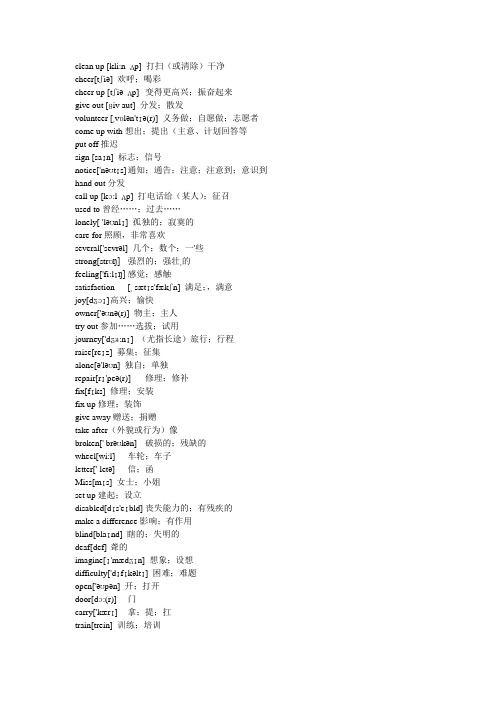
clean up [kli:n ʌp] 打扫(或清除)干净cheer[tʃiə] 欢呼;喝彩cheer up [tʃiəʌp] 变得更高兴;振奋起来give out [ɡiv aut] 分发;散发volunteer [ˌvɒlən'tɪə(r)] 义务做;自愿做;志愿者come up with想出;提出(主意、计划回答等put off推迟sign [saɪn] 标志;信号notice['nəʊtɪs] 通知;通告;注意;注意到;意识到hand out分发call up [kɔ:l ʌp] 打电话给(某人);征召used to曾经……;过去……lonely[ 'ləʊnlɪ] 孤独的;寂寞的care for照顾,非常喜欢several['sevrəl] 几个;数个;一'些strong[strɒŋ]强烈的;强壮ˌ的feeling['fi:lɪŋ]感觉;感触satisfaction [ˌsætɪs'fækʃn] 满足;,满意joy[dʒɔɪ] 高兴;愉快owner['əʊnə(r)] 物主;主人try out参加……选拔;试用journey['dʒɜ:nɪ] (尤指长途)旅行;行程raise[reɪz] 募集;征集alone[ə'ləʊn] 独自;单独repair[rɪ'peə(r)] 修理;修补fix[fɪks] 修理;安装fix up修理;装饰give away赠送;捐赠take after(外貌或行为)像broken[' brəʊkən] 破损的;残缺的wheel[wi:l] 车轮;车子letter[' letə] 信;函Miss[mɪs] 女士;小姐set up建起;设立disabled[dɪs'eɪbld] 丧失能力的;有残疾的make a difference影响;有作用blind[blaɪnd] 瞎的;失明的deaf[def] 聋的imagine[ɪ'mædʒɪn] 想象;设想difficulty['dɪfɪkəltɪ] 困难;难题open['əʊpən] 开;打开door[dɔ:(r)] 门carry['kærɪ] 拿;提;扛train[trein] 训练;培训excited[ɪk' saɪtɪd] 激动的;兴奋的training[' treɪnɪŋ]训练;培训kindness ['kaɪndnəs] 仁慈;善良clever[' klevə] 聪明的;聪颖的understand[ˌʌndə'stænd] 理解;领会change[tʃeɪndʒ] 变化;改变interest['ɪntrəst] 兴趣;关注sir[sɜ:(r)] 先生(用于正式信函中对不知名的男性收信人的称呼时)madam['mædəm] 夫人;女士(用于正式信函中对不知名的女性收信人的称呼时)Mario['mærɪəʊ] 马里奥(男名Jimmy [' dʒimi] 吉米(男名。
译林版四下Unit2知识点归纳
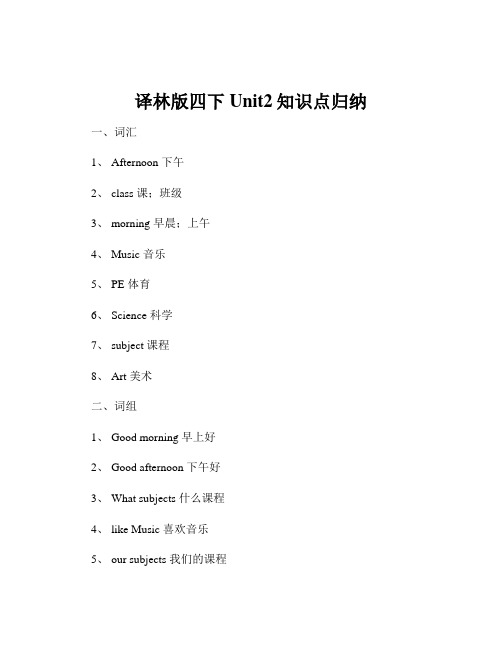
译林版四下Unit2知识点归纳一、词汇1、 Afternoon 下午2、 class 课;班级3、 morning 早晨;上午4、 Music 音乐5、 PE 体育6、 Science 科学7、 subject 课程8、 Art 美术二、词组1、 Good morning 早上好2、 Good afternoon 下午好3、 What subjects 什么课程4、 like Music 喜欢音乐5、 our subjects 我们的课程6、 Welcome back to 欢迎回到7、 Nice to see you 见到你很高兴三、句型1、—What subjects do you like? 你喜欢什么课程?—I like Chinese and Maths 我喜欢语文和数学。
2、—What subjects do they like? 他们喜欢什么课程?—They like English and Art 他们喜欢英语和美术。
3、—Do you like Music? 你喜欢音乐吗?—Yes, I do 是的,我喜欢。
—No, I don't 不,我不喜欢。
4、 We have Music and PE 我们有音乐和体育。
5、 It's time for 到的时间了。
四、语法1、一般现在时中关于“喜欢”的表达“喜欢”用“like”,其否定形式是“don't like”(第一、二人称及复数)或“doesn't like”(第三人称单数)。
例如:I like Maths 我喜欢数学。
He doesn't like Science 他不喜欢科学。
2、特殊疑问句以特殊疑问词开头的疑问句叫特殊疑问句。
常见的特殊疑问词有:what(什么)、where(哪里)、who(谁)、whose(谁的)、when (什么时候)、how(怎样)等。
本单元重点学习“What subjects do you/they like?”来询问喜欢的课程。
Unit2知识点梳理
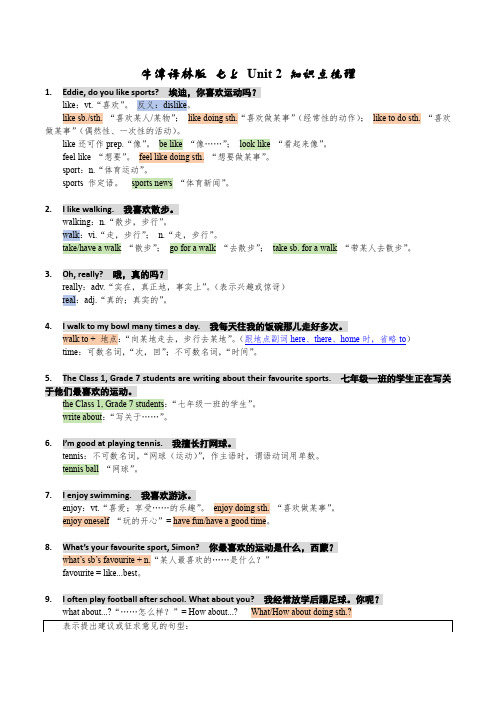
牛津译林版七上Unit 2 知识点梳理1.Eddie, do you like sports? 埃迪,你喜欢运动吗?like:vt.“喜欢”。
反义:dislike。
like sb./sth. “喜欢某人/某物”;like doing sth.“喜欢做某事”(经常性的动作);like to do sth. “喜欢做某事”(偶然性、一次性的活动)。
like还可作prep.“像”。
be like “像……”;look like “看起来像”。
feel like “想要”。
feel like doing sth. “想要做某事”。
sport:n.“体育运动”。
sports 作定语。
sports news “体育新闻”。
2.I like walking. 我喜欢散步。
walking:n.“散步,步行”。
walk:vi.“走,步行”;n.“走,步行”。
take/have a walk “散步”;go for a walk “去散步”;take sb. for a walk “带某人去散步”。
3.Oh, really? 哦,真的吗?really:adv.“实在,真正地,事实上”。
(表示兴趣或惊讶)real:adj.“真的;真实的”。
4.I walk to my bowl many times a day. 我每天往我的饭碗那儿走好多次。
walk to + 地点:“向某地走去,步行去某地”。
(跟地点副词here、there、home时,省略to)time:可数名词,“次,回”;不可数名词,“时间”。
5.The Class 1, Grade 7 students are writing about their favourite sports. 七年级一班的学生正在写关于他们最喜欢的运动。
the Class 1, Grade 7 students:“七年级一班的学生”。
write about:“写关于……”。
6.I’m good at playing tennis. 我擅长打网球。
英语八年级下册unti2知识点
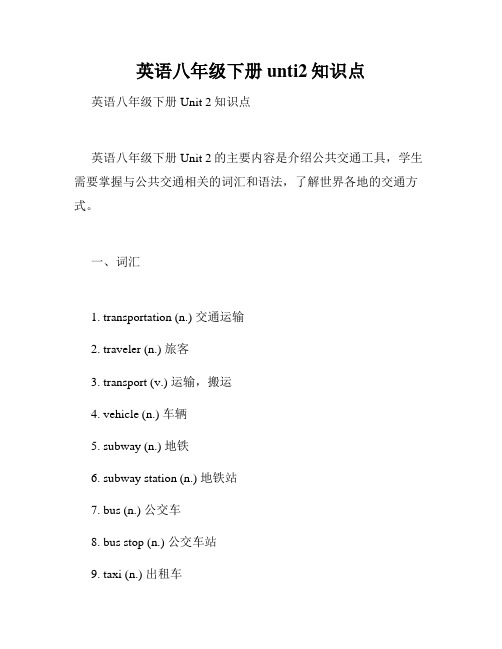
英语八年级下册unti2知识点英语八年级下册Unit 2知识点英语八年级下册Unit 2的主要内容是介绍公共交通工具,学生需要掌握与公共交通相关的词汇和语法,了解世界各地的交通方式。
一、词汇1. transportation (n.) 交通运输2. traveler (n.) 旅客3. transport (v.) 运输,搬运4. vehicle (n.) 车辆5. subway (n.) 地铁6. subway station (n.) 地铁站7. bus (n.) 公交车8. bus stop (n.) 公交车站9. taxi (n.) 出租车10. bridge (n.) 桥11. intersection (n.) 十字路口12. pedestrian (n.) 行人13. traffic light (n.) 交通灯14. highway (n.) 高速公路15. tram (n.) 有轨电车二、语法1. 现在进行时现在进行时用来描述正在进行的动作或状态,结构为 be + 动词+ ing,例如:I am taking the subway to work. 我正在坐地铁去上班。
They are walking to the bus stop. 他们正在步行去公交车站。
2. 一般现在时一般现在时用来描述经常性或习惯性的动作或状态,结构为主语+动词原形,例如:She usually takes the bus to school. 她通常乘公交车去上学。
The traffic light turns red. 交通灯变为红色。
3. 介词 in 和 on 的用法in 用来表示在某个范围之内,例如在一年中的某个月份、某个季节等,例如:I usually travel in the summer. 我通常在夏天旅行。
He studies in the library. 他在图书馆学习。
on 用来表示在某个表面上,例如在地图、日历、时间上,例如:She marked the date on the calendar. 她在日历上标记了日期。
人教版高一英语必修二Unit2课文翻译
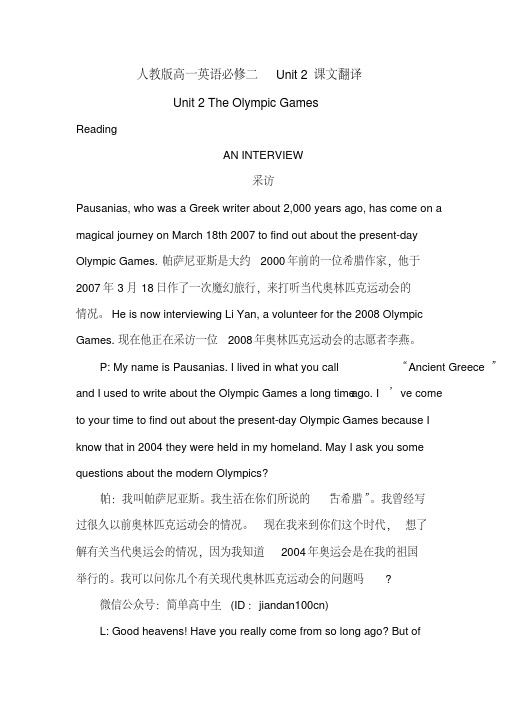
人教版高一英语必修二Unit 2课文翻译Unit 2 The Olympic GamesReadingAN INTERVIEW采访Pausanias, who was a Greek writer about 2,000 years ago, has come on amagical journey on March 18th 2007 to find out about the present-dayOlympic Games. 帕萨尼亚斯是大约2000年前的一位希腊作家,他于2007年3月18日作了一次魔幻旅行,来打听当代奥林匹克运动会的情况。
He is now interviewing Li Yan, a volunteer for the 2008 OlympicGames. 现在他正在采访一位2008年奥林匹克运动会的志愿者李燕。
P: My name is Pausanias. I lived in what you call “Ancient Greece” and I used to write about the Olympic Games a long time ago. I’ve cometo your time to find out about the present-day Olympic Games because Iknow that in 2004 they were held in my homeland. May I ask you somequestions about the modern Olympics?帕:我叫帕萨尼亚斯。
我生活在你们所说的“古希腊”。
我曾经写过很久以前奥林匹克运动会的情况。
现在我来到你们这个时代,想了解有关当代奥运会的情况,因为我知道2004年奥运会是在我的祖国举行的。
我可以问你几个有关现代奥林匹克运动会的问题吗?微信公众号:简单高中生(ID:jiandan100cn)L: Good heavens! Have you really come from so long ago? But ofcourse you can ask any questions you like. What would you like to know?李:天哪!你真的来自那么久远的年代?当然你可以问你想问的问题。
高中英语必修二unit2原文

高中英语必修二unit2原文"Brave New World" is a novel by Aldous Huxley that explores a dystopian society where technology and government control dominate every aspect of human life. In this world, people are genetically engineered and conditioned to fit into specific social classes, with little to no room for individuality or free will. The government uses various methods, such as mind-altering drugs and psychological manipulation, to maintain control over its citizens. The novel raises important questions about the consequences of sacrificing personal freedoms for societal stability.《美丽新世界》是奥尔德斯·赫胥黎创作的一部小说,探讨了一个科技和政府控制主导一切人类生活方面的反乌托邦社会。
在这个世界里,人们被基因工程和社会阶级的条件所改造,几乎没有个性或自由意志的空间。
政府利用各种方法,如改变心灵的药物和心理操纵,来维持对公民的控制。
这部小说引发了关于为了社会稳定而牺牲个人自由所带来的后果的重要问题。
One of the central themes of "Brave New World" is the idea of happiness and the price that society is willing to pay for it. In the novel, the citizens of the World State are kept content through theuse of pleasure-inducing drugs and instant gratification, but at the cost of their individuality and humanity. This raises the question of whether true happiness can be achieved without the presence of personal freedom and self-expression.《美丽新世界》的一个核心主题是幸福的概念以及社会愿意为之付出的代价。
- 1、下载文档前请自行甄别文档内容的完整性,平台不提供额外的编辑、内容补充、找答案等附加服务。
- 2、"仅部分预览"的文档,不可在线预览部分如存在完整性等问题,可反馈申请退款(可完整预览的文档不适用该条件!)。
- 3、如文档侵犯您的权益,请联系客服反馈,我们会尽快为您处理(人工客服工作时间:9:00-18:30)。
• crinkly: adj. having many thin folds or wrinkles; curly e.g. The pages of the book are yellow and crinkly as a result of long age. → Derivation: crinkle vt./ n. • be supposed to: 1) to have to; to have a duty or a responsibility to ① They were supposed to be here an hour ago. 他们应该在一小时以前到达这里。
• Part
Two: It tells us a conversation
between the two leading characters, Margie and Tommy, running through most of it.
• Part e: It tells us something
The settings for science fiction are often contrary to known reality, but most science fiction relies on a considerable degree of suspension of disbelief ( 怀 疑 暂 停 ), which is facilitated ( 使 便 利 , 有 助 于 ) in the reader's mind by potential scientific explanations or solutions to various fictional elements. Science fiction elements include:
Science fiction is largely based on writing rationally about alternative (供选 择的 ) possible worlds or futures. It is similar to, but differs from fantasy (幻 想作品) in that, within the context of the story, its imaginary elements are largely possible within scientifically established or scientifically postulated ( 假 定 的 ) laws of nature (though some elements in a story might still be pure imaginative speculation (推断,思考).
about the schoolroom, and the mechanical teacher, Margie’s
thoughts. It also reveals indirectly how children in the distant future dislike school with a mechanical
teacher only and how they wish to
have human teachers teaching them.
V. Detailed Analysis
Part 1: Para. 1
1. When did the story happen? 2. What did Margie write in her
A time setting in the future, in alternative timelines, or in a historical past that contradicts known facts of history or the archaeological (考古学的) record. A spatial ( 空 间 的 ) setting or scenes in outer space (e.g. spaceflight), on other worlds, or on subterranean (地下的) earth.
diary on the night of May 17,
2157?
July 21st, 2013 Thursday
Diary
Thursday, July 21st, 2013
Sunny
On the way to the classroom, beautiful scenery jumped into my sight. On both sides of the road stood plenty of trees, green and tall. When raising my head, I got a view of many lovely birds flying freely in the blue sky.
II. Background Information
Science fiction is a genre of fiction dealing with imaginary but more or less plausible ( 貌似真实的 ) (or at least non-supernatural) content such as future settings, futuristic science and technology, space travel, parallel universes, aliens ( 外 星 人 ), and paranormal ( 超 自 然 的 ) abilities. Exploring the consequences of scientific innovations is one purpose of science fiction, making it a “literature of ideas”.
Characters that include aliens, mutants ( 突 变 体 ), androids ( 机 器 人 ), or humanoid (类人的) robots. Technology that is futuristic (e.g. ray guns, teleportation ( 电 子 传 输 ) machines, humanoid computers). Scientific principles that are new or that contradict known laws of nature, for example time travel, wormholes ( 时空中假象的结构,连接两个 不 同 时 空 的 狭 窄 隧 道 ), or faster-thanlight travel.
Other universes or dimensions and travel between them.
III. Main Idea of the Text
The text tells us that Margie, a girl who is aged 11 in 2157, always _____ hates school because her teacher is a _________ mechanical one and she has to learn at regular hours and homework and test papers into a put her _____________________ slot in the _______. machine It also tells us how envious she is of the children who studied ______ together, experienced _______, great fun and had ______ human teachers about two hundred years earlier.
VI. Exercises
VII. Summary and Homework
I. Pre-reading Questions
1. Obviously our fathers or their fathers were taught differently from the way we are taught. And without doubt people in the future will be taught still differently. Can you imagine how they will be taught? 2. With the ever increasingly rapid development of science and technology, what will future schools be like in your opinion?
→ Synonym: lead
Part 2: Para. 2-30
1. What is the conversation concerned with? A very old book about the old kind of school with human teachers that existed about two centuries ago. 2. Why does Margie hate school? Because learning with the help of a machine teacher is both boring and full of pressure.
Then I was lost in thought.
•
head. vt. 1) to be at the front or top of something ① The chapter was headed My Early Life. 这一章的标题是“我早年的生活”。 ② The Queen ’ s carriage headed the procession. 2) t o b e i n c h a r g e o f a g r o u p o r organization She heads one of Britain’s leading travel firms. 她是英国一家主要的旅游公司的领导人。
